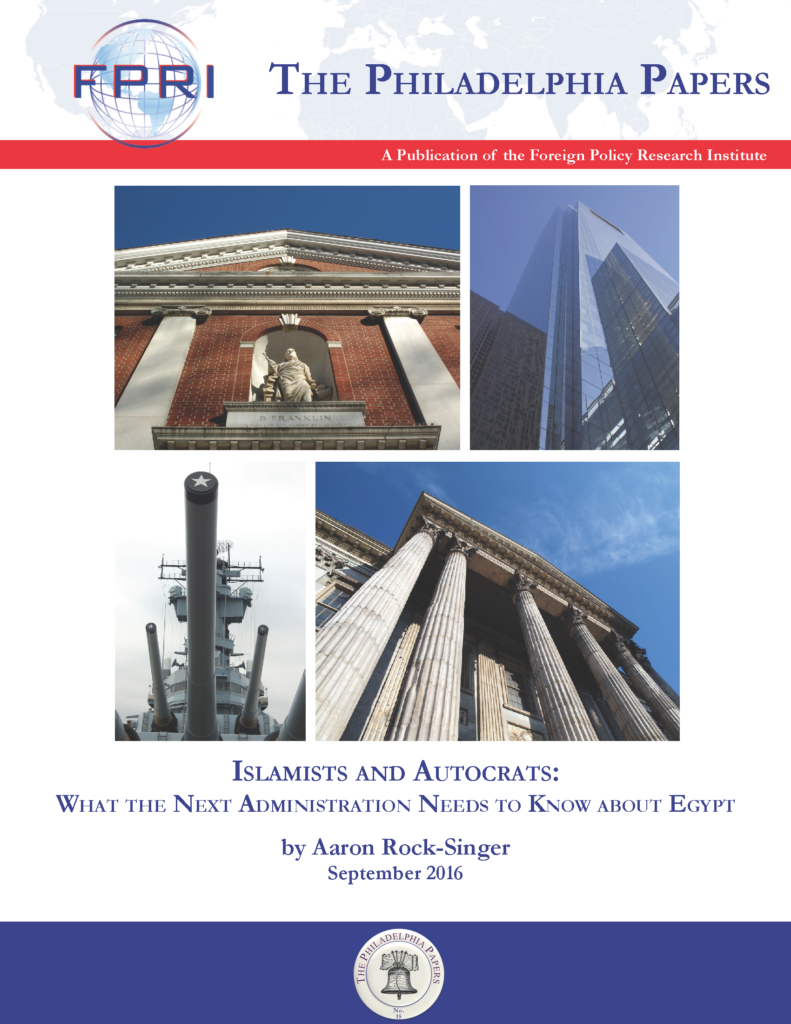A nation must think before it acts.
On June 30 2012, Muhammad Mursi, a longtime member of the Muslim Brotherhood, was sworn in as Egypt’s President. Only a year later, on the anniversary of the ascent of this Islamist to the highest office in Egypt, hundreds of thousands of Egyptians flooded the streets of Cairo to contest the legitimacy of Mursi’s rule and, shortly thereafter, the Egyptian army intervened to topple him. The following year, ‘Abd al-Fattah al-Sisi, who had previously served as the head of Egypt’s highest military body, the Supreme Council of the Armed Forces (SCAF), was elected President. Both the period of Mursi’s rule and that of Sisi saw significant bloodshed: whether attacks on anti-Mursi protestors by Brotherhood-backed armed factions, or the crackdown by state security forces on Islamist supporters in Raba‘a al-‘Adawiyya and Nahda squares, political violence has become the norm rather than the exception in post-2011 Egypt.
How should we understand these conflicts, and what crucial insights do they provide for American policy towards Egypt? Previous studies of Egypt tell a story in which Islamists seek to transform Egypt along religious lines, while the regime seeks to contain these efforts. In this narrative, groups such as the Brotherhood and the Salafi Nur party both seek to undermine religious moderation in Egypt, and to destabilize U.S. political and economic interests in Egypt and beyond. Put simply, the only way to protect religious freedom in Egypt and American influence regionally is to repress Islamists.
Such a mission of curbing Islamism generally, and Islamist radicals in particular through repression, is fool’s gold. In fact, as this e-book will demonstrate, the Arab nationalist regimes that have ruled Egypt since 1952 have also attempted to impose their interpretations of Islam on the population. This is an important and almost completely overlooked point. As such, a common argument against the strategy of regime repression is that it radicalizes existing organizations.[1] But such an argument is insufficient because it leaves in place the dichotomy between Islamists, who want to impose a certain interpretation of religion and the Arab nationalist rulers, who do not. By detailing how Egyptian regimes have incorporated Islam into their ruling strategies, I will make a separate but related claim: state-sponsored politicization of religion in the name of national security not only radicalizes existing groups, but also supplies the kindling for later religious radicalization because it eliminates all space for religious-based dissent while elevating Islam as the most powerful symbol of political authority.
Accordingly, it is not merely that government crackdowns on Islamists threaten U.S. interests in Iraq and Syria by providing a fertile recruiting base for ISIS and Jihadi movements, but also that the efforts of the Egyptian state to lay exclusive claim to Islam transform potentially resolvable religious disagreements into existential conflicts. Put differently, the policies of the Sisi regime do not merely respond to existing radicalism, but also actively create the seeds for future radicalism beyond organizations such as al-Qaeda or ISIS. A successful effort to promote religious liberty in Egypt and to fight Jihadis in Iraq and Syria thus depends on the United States jettisoning the false security offered by Sisi.
Although the United States is not in a position to directly influence Sisi’s treatment of the Brotherhood or his religious policies more broadly, it can influence these policies indirectly. Specifically, it must work with Qatar and Saudi Arabia, who hold financial sway with the Brotherhood and Sisi, respectively, to push both sides to a real, if begrudging, coexistence. The end goal of this strategy, however, should not be to restore Mursi to power. Rather, the United States should support a return to the Mubarak era’s modus operandi: freedom to spread the call of the Brotherhood within society and to compete for a minority of parliamentary seats. While such a strategy will hardly resolve the broader political dysfunctions of authoritarian rule in Egypt, it could significantly lessen the risks of religious radicalization
This Philadelphia Paper will shed light on the future of religion, politics, and radicalization in Egypt and beyond by tracing the historical and contemporary relationship between the Muslim Brotherhood, Salafis, and the post-1952 military regime. It will then turn to the post-2013 period of ‘Abd al-Fattah al-Sisi’s rule, first as the head of the Supreme Council of the Armed Forces (SCAF) and then as President of Egypt. While previous studies of the state’s religious role have analyzed the importance of al-Azhar university as a symbol of state-sponsored religious moderation,[2] this study will move beyond al-Azhar’s elite pronouncements. Instead, it will focus on the Ministry of Endowments (MOE), a sprawling body within the state which controls tens of thousands of mosques, dictating the contents of the Friday sermon, deciding who preaches, and excluding those Muslim Brothers and Salafis who challenge its monopoly on religion.
This is not to suggest that the Egyptian-American relationship should be refashioned around Islam generally or the Muslim Brotherhood in particular. The United States and Egypt share core interests, including military training and merchandise, passage through the Suez Canal, and the maintenance of peace between Egypt and Israel. Yet, trying to understand Egypt through these issues alone would constrain the ability of the next administration to navigate other major driving forces in Egypt that impact both countries. The oft misunderstood relationship between religion and state, and in particular religious moderation and radicalism, not only impacts questions related to how to handle civil unrest and violence, civil and human rights, and the position of religious minorities within the Arab world’s largest state, but also sets the tone for trends in the larger region.
The relationship between Sisi, the Muslim Brotherhood, and Salafis appears to confirm straightforward narratives of ideological polarization. To listen to the Sisi government, the Brotherhood is a “terrorist” organization indistinguishable from ISIS, with the Brotherhood returning the favor by describing Egypt’s Prime Minister as a “tyrant.” In parallel, Egyptian Jihadi groups such as Ansar al-Bayt al-Maqdis as well as transnational Jihadi organizations such as ISIS and al-Qaeda categorize Sisi as an infidel. Indeed, such groups consider the Brotherhood’s previous participation in democratic elections and subsequent refusal to unequivocally embrace the use of violence against government and civilian targets alike as intolerable deviations from devotion to divine command.
What drives the relationship between Sisi, Muslim Brothers, and Salafis, and how will it shape the future of both democratic rule and religious pluralism in Egypt? Previous analyses claim, implicitly or explicitly, that the primary driver of religious change in Egypt is Islamist activism generally, and that of the Muslim Brotherhood specifically.[3] Related to this first argument is a second claim that the Islamist drive for power threatens political pluralism and the rule of law in Egypt,[4] and U.S. interests abroad.[5] In this narrative, the set of competing institutions that comprise the Egyptian state are, at best, marginal actors.
This Philadelphia Paper does not seek to dispute the historical significance of Islamist parties in shaping religious ideas and practices of Egyptian society, nor does it seek to deny the tension between Islamist projects of political change on the one hand, and religious pluralism and U.S. interests, on the other. Instead, through a historical overview of the relationship among these factions and present analysis of the ever-increasing reach of the Ministry of Endowments, it argues that these dynamics are secondary to, and emerge out of a longer history of, state-sponsored claims to Islam. Specifically, a focus on increasing Islamist influence—while empirically accurate in a vacuum—obscures the reality that Brotherhood and Salafi efforts to spread their call have long been mirrored by the state’s continued attempts to control religious practice.
Indeed, far from coincidental, this state-sponsored drive to control Islam emerges out of a history of government ambitions to control political, economic and social life—an approach known as Statism.[6] In the religious sphere, Sisi’s warnings against the “politicization of the mosque” (tasyis al-masjid) seek to obscure the reality that the MOE’s activities do not secure a separation of religion and politics or preserve space for religious expression free of coercion. Rather, this key body seeks to make religion into a state monopoly in the service of the regime’s political agenda. This context, in turn, is crucial background for the emergence of radicalism in both Brotherhood and Salafi circles, even as the more common response in both groups has been to turn to local preaching and political accommodation.
Click the image below to read the E-Book in its entirety.
Acknolwedgments: I would like to thank Samuel Helfont, Tally Helfont, Alan Luxenberg, and William Burke-White for their comments on this e-book.
[1] As Justin Siberell, the State Department’s Acting Coordinator for Counterterrorism notes, “there is quite well understood linkage in some cases between repressive policies of governments, including in its security practices, as a contributing factor in some cases to radicalization.” See Department of State, Special Briefing, Country Reports on Terrorism 2015, June 2, 2016.
[2] For example, see Nathan J. Brown, Post-Revolutionary al-Azhar (Washington, DC: Carnegie Endowment for International Peace, September 2011); Jon B. Alterman, “Al-Azhar’s Perilous Resurgence,” Middle East Notes and Comment, Center for Strategic and International Studies, April 20, 2015. Several studies also examine the Ministry of Endowments yet do not engage with the relationship between this state body and broader religio-political shifts. See Geoges Fahmi, “The Egyptian State and the Religious Sphere,” Carnegie Endowment for International Peace, September 18, 2014; Tarek Radwan, “Egypt’s Ministry of Endowments and the Fight Against Extremism,” The Atlantic Council, July 23, 2015.
[3] For examples of academic scholarship, see Abdullah al-Arian, Answering the Call: Popular Islamic Activism in Sadat’s Egypt (New York: Oxford University Press, 2015); Carrie Rosefsky Wickham, Mobilizing Islam: Religion, Activism, and Political Change in Egypt (New York: Columbia University Press, 2002). For examples of policy-oriented research that explicitly examines this question with relation to the period of Mursi’s rule, see Yohanan Maor, “Inculcating Islamist Ideals in Egypt,” The Middle East Quarterly (Fall 2015); Mariz Tadros, “Egypt: The Islamization of State Policy,” Open Democracy 8 (January 2013).
[4] For example, see Ashraf El-Sharif, “The Egyptian Muslim Brotherhood’s Failures,” Carnegie Endowment for International Peace, July 2014, 3; Eric Trager, “Shame on Anyone Who Ever Thought Mohammad Morsi Was a Moderate,” The New Republic, November 26, 2012; and Muhammad Faour, “Religious Education and Pluralism in Egypt and Tunisia,” Carnegie Endowment for International Peace, August 13, 2012.
[5] For example, see Eric Trager, “The Unbreakable Muslim Brotherhood: Grim Prospects for a Liberal Egypt,” Foreign Affairs, September-October 2011.
[6] Scholars have previously highlighted the Sisi regime’s Statist economic ambitions. See Michael Wahid Hanna, “Egypt’s Next Phase: Sustainable Instability,” The Century Foundation, July 1, 2015; Steven A. Cook, “Morsi’s Mistake: The Error Beyond the Uproar in Egypt,” Foreign Affairs, December 2, 2012.






